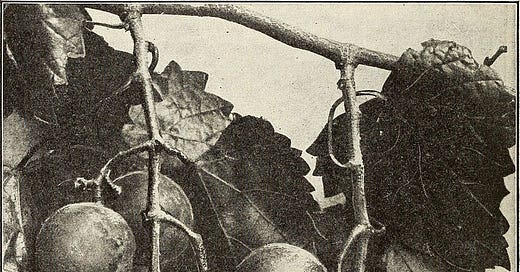In Wendell Berry’s short story, “The Wild Birds,” the character Burley Coulter says: “The way we are, we are members of each other. All of us. Everything. The difference ain’t in who is a member and who is not, but in who knows it and who don’t.” Membership and remembering our connection, all of us to everything, is at the heart of our Gospel for this Sunday. The reality is that in small circles or wide ones, we are dependent upon one another in an intricate web of relationships. To live is to be involved in a life together, a mutuality of service.
I saw a small sign of that truth yesterday, on a hike with my family through the woods. We were following a path that worked in switchbacks up a mountain ridge. The forest was dense, a mix of oaks, hickories, and pines with wild grapes and muscadines growing here and there. At one turn, a muscadine growing up the trunk of a hickory was full of fruit—deep purple berries, hidden among the leaves. I stood on a rock and picked a handful, sharing them with my family. We bit into the sour skin, chewing it with the sweet center while avoiding the bitter seeds. Those we worked loose and spit into the woods beside the trail.
All of it was a simple and wondrous work of mutuality. The muscadines, along with American Beauty Berries, acorns, and hickories were ripening as we move into fall—providing food to fuel winter fat stores for resident animals and nourishment for migrating birds. By eating the fruit, enjoying its tart-sweetness, my family along with the opossums and raccoons and myriad other animals that enjoy muscadines, were spreading their seeds—ensuring more muscadines for future generations. We were all parts in a greater wholeness, one whose pattern is repeated at infinite scales from the microscopic to the cosmic.
But what would have happened, if instead of eating those muscadines along the trail, spitting the seeds into the leaf litter, I had harvested all that were ripe, put them in my pack, and taken them home? What if, after eating them, I had spit the seeds into a trash can whose contents would end up in a landfill? The ties of mutuality and membership would have been broken. I would have acted in modes of monopoly and extraction rather than mutuality and shared generosity.
All too often, in our economy and culture, we have chosen to act as individuals rather than as members. And as individuals, disconnected from the common life of shared abundance, our only choice is to take all that we can and hold it in reserve for our own use. Because we no longer see our community as a source of life and sharing, we work to protect ourselves from those around us, seeking to secure ourselves in enclaves of sameness.
It would be a blessing, then, if a friend—one who loves and cares for us—came to tell us the truth about what we were doing. “You are abandoning us!” This friend might say. “We need you, but you haven’t been showing up for us,” the friend might add. But if we’ve been slipping down the hole of self-centeredness, no longer recognizing our place within the membership, we might be resistant to such a challenge. We might squirm against this word of truth. So it is that another friend might be brought along to say, “its not just this friend, its all of us who are suffering from your absence.”
This is the pattern that Jesus is offering in Matthew 18. It is not about searching out the bad people in our midst, those who are sinners according to some abstract moral code. What Jesus is offering is a call to recognize the membership and mutuality of our life together, and the reality that certain actions of selfishness, of extraction and control, can diminish the wholeness of the community. It is a way of saying, we need you, but we can’t let you continue to break our community apart if you won’t share in the mutuality our common life.




